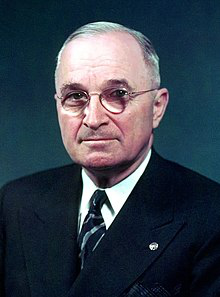

President of the United States
May 8, 1884 Lamar, Missouri, U.S.
December 26, 1972(1972-12-26) (88) Kansas City, Missouri, U.S.
April 12, 1945 – January 20, 1953
33rd president of the United States (1945–53) "Harry Truman" redirects here. For other uses, see Harry Truman (disambiguation). Harry S. TrumanOfficial portrait, c. 194733rd President of the United StatesIn office April 12, 1945 – January 20, 1953Vice President None (1945–1949) Alben W. Barkley (1949–1953) Preceded by Franklin D. RooseveltSucceeded by Dwight D. Eisenhower34th Vice President of the United StatesIn office January 20, 1945 – April 12, 1945PresidentFranklin D. RooseveltPreceded by Henry A. WallaceSucceeded by Alben W. BarkleyUnited States Senator from MissouriIn office January 3, 1935 – January 17, 1945Preceded by Roscoe C. PattersonSucceeded by Frank P. BriggsPresiding Judge of Jackson County, MissouriIn office January 1, 1927 – January 1, 1935Preceded by Elihu W. HayesSucceeded by Eugene I. PurcellJudge of Jackson County, Missouri's Eastern DistrictIn office January 1, 1923 – January 1, 1925Preceded by James E. GildaySucceeded by Henry Rummel Personal detailsBorn(1884-05-08 ) May 8, 1884 Lamar, Missouri, U.S.DiedDecember 26, 1972(1972-12-26) (aged 88) Kansas City, Missouri, U.S.Resting placeHarry S. Truman Presidential Library and Museum, Independence, Missouri, U.S.Political partyDemocraticSpouse(s)Bess Wallace (m. 1919 )ChildrenMargaretParents John Anderson Truman Martha Ellen Young Education Spalding's Commercial College UMKC School of Law (withdrew) OccupationPoliticianbusinessmanfarmerSignatureMilitary serviceAllegianceUnited StatesServiceUnited States ArmyYears of service 1905–1911 (National Guard) 1917–1919 (Army) 1920–1953 (Army Reserve) RankColonel (Army Reserve)CommandsBattery D, 129th Field Artillery Regiment, 35th Division1st Battalion, 379th Field Artillery Regiment, 102nd Infantry Division379th Field Artillery Regiment, 102nd Infantry DivisionBattles World War I St. Mihiel Meuse-Argonne Defensive Sector Awards World War I Victory Medal Armed Forces Reserve Medal (2) Harry S. Truman (May 8, 1884 – December 26, 1972) was the 33rd president of the United States, serving from 1945 to 1953, succeeding upon the death of Franklin D. Roosevelt after serving as the 34th vice president in early 1945. He implemented the Marshall Plan to rebuild the economy of Western Europe and established the Truman Doctrine and NATO to contain communist expansion. He proposed numerous liberal domestic reforms, but few were enacted by the Conservative Coalition that dominated Congress. Truman grew up in Independence, Missouri, and during World War I fought in France as a captain in the Field Artillery. Returning home, he opened a haberdashery in Kansas City, Missouri, and was later elected as a Jackson County official in 1922. Truman was elected to the United States Senate from Missouri in 1934 and gained national prominence as chairman of the Truman Committee, which was aimed at reducing waste and inefficiency in wartime contracts. Soon after succeeding to the presidency, he authorized the first and only use of nuclear weapons in war. Truman's administration engaged in an internationalist foreign policy and renounced isolationism. He rallied his New Deal coalition during the 1948 presidential election and won a surprise victory that secured his own presidential term. After the onset of the Cold War, Truman oversaw the Berlin Airlift and Marshall Plan in 1948. When North Korea invaded South Korea in 1950, he gained United Nations approval to intervene in the Korean War. He did not ask for Congressional approval, and as the war stalemated his popularity fell. His administration successfully guided the U.S. economy through the postwar economic challenges; the expected postwar depression never happened. In 1948, he submitted the first comprehensive civil rights legislation. It did not pass, so he instead issued Executive Orders 9980 and 9981 to begin racial equality in federal agencies and the military. Corruption in the Truman administration became a central campaign issue in the 1952 presidential election. He was eligible for reelection in 1952, but with weak polls he decided not to run. Republican Dwight D. Eisenhower attacked Truman's record and won easily. Truman went into a retirement marked by the founding of his presidential library and the publication of his memoirs. It was long thought that his retirement years were financially difficult for Truman, resulting in Congress voting a pension for former presidents, but ample evidence eventually emerged that he amassed considerable wealth after leaving office. When he left office, Truman's presidency was heavily criticized, though critical reassessment of his tenure has been favorable.

We use cookies
We use cookies and other tracking technologies to improve your browsing experience on our website, to show you personalized content and targeted ads, to analyze our website traffic, and to understand where our visitors are coming from. Privacy Policy.